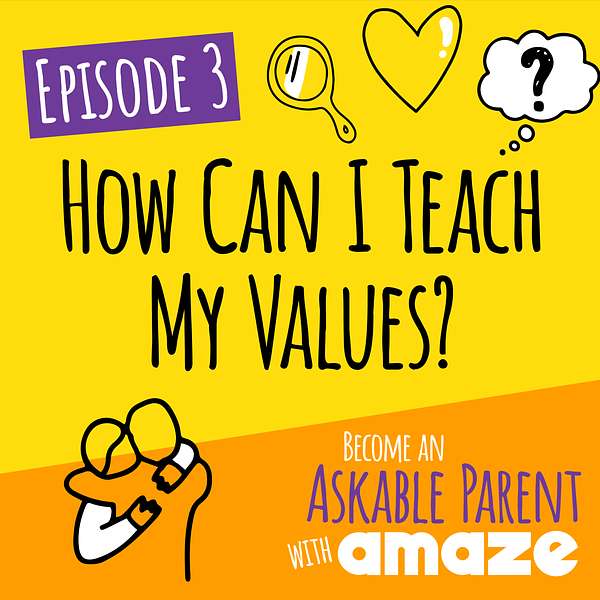
Become an Askable Parent with AMAZE
Become an Askable Parent with AMAZE
How Can I Teach My Values?
Use Left/Right to seek, Home/End to jump to start or end. Hold shift to jump forward or backward.
Wondering how to become an askable parent? AMAZE is here to help! In this episode, you’ll learn how to teach your kids your values, including how to name the values behind your rules + help kids develop a values vocabulary, and how these skills will help them in the long run.
Become An Askable Parent is a podcast from AMAZE.org. AMAZE creates free educational videos + resources to help families talk openly, honestly, and less awkwardly about sex, health, relationships + growing up. The goal of the podcast is to help parents learn how to communicate better (even when they don’t have all the answers!) so their kids know that they can ask them anything.
Connect with AMAZE.org on YouTube (@amazeparents), Facebook (@amazeparents), and Twitter (@amazeorg).
Host: 0:02
Welcome to the AMAZE podcast! AMAZE creates free educational videos and resource is to help families talk openly, honestly and less awkwardly about sex, health, relationships and growing up. Our goal is to help you become an askable parent through short, actionable podcast episodes. In today's episode, you'll learn how to teach your kids your values, including how to name the values behind your rules and help kids develop a values vocabulary, and how these skills will help them in the long run.
Educator: 0:36
Welcome back, everyone. So tonight we're gonna talk about teaching our children the values we want them to value. To do that well, we have to know what our cherished values are, and then we have to identify and name them for our children.
Parent 1: 0:50
Naming our values?
Educator: 0:52
We adults are good at rules. We give our kids a lot of shoulds and should nots, right?
Parent 2: 0:57
You mean like, "you should not scream loudly and do the octopus dance on the table at a restaurant"? If only that worked more often.
Educator: 1:07
Ah, but a message will be much stronger if we name the value behind the rule and combine the two. For example, "it's very important to respect the other people eating in this restaurant, so you shouldn't scream loudly while they're trying to enjoy their meal." And here's another bonus. If we make a point of naming our values, our kids will begin to develop their own values vocabulary.
Parent 2: 1:29
I like that! A values vocabulary.
Educator: 1:33
Plus, because your kids are still really young, you can plan ahead, starting now for certain issues that might be challenging later on, and where this vocabulary will really come in handy.
Parent 3: 1:45
Like when they hear song lyrics that are really raunchy.
Parent 4: 1:48
Or see sexy lady and macho men stereotypes.
Parent 2: 1:51
Or when they hear other kids making gay and transgender jokes.
Educator: 1:55
And remember that the problem with most of these examples isn't that kids are being exposed to sexuality. It's that they're learning about it in the wrong way. If we've made a point of naming the values we want our children to cherish, like respect, kindness, caring, fairness and responsibility, we can help them apply those same values to situations involving sexuality and gender, too.
Parent 2: 2:19
But how do I control what other kids say about all of these things?
Educator: 2:23
Sadly, we can't. And we can't raise our kids in a bubble, either. But if we remember to consciously name and teach our values, especially when our kids are young, we can empower them to recognize right and wrong in their own behavior, and in other people's too.
Parent 3: 2:39
Wow, that makes me feel less worried and more powerful.
Parent 2: 2:43
Amen to that. I'm gonna try naming my values. Maybe then we can limit the octopus dance to more appropriate locations.
Host: 2:57
Thanks for joining us today! To find more free educational resource is from AMAZE, including videos, book recommendations, conversational scripts and more, visit amaze.org. You can also connect with us on YouTube and Facebook at @amazeparents and on Twitter at @amazeorg. Thanks for listening!